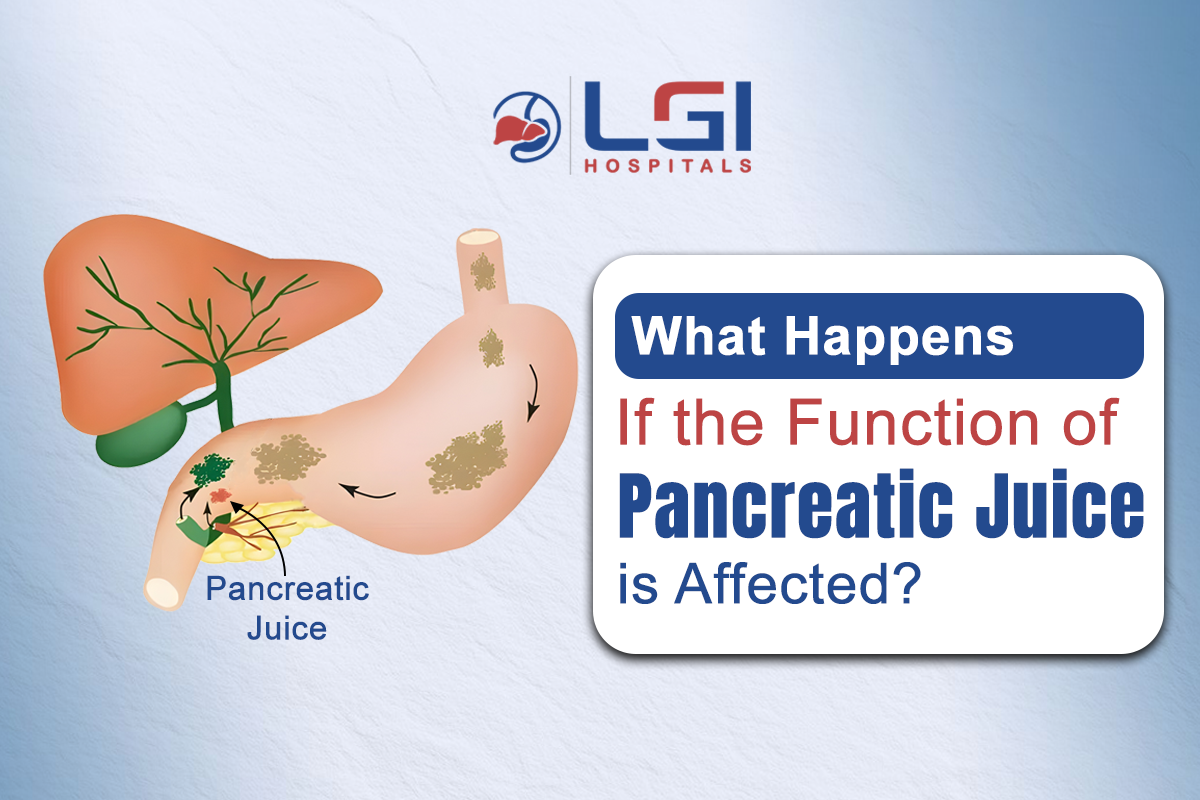If you’re struggling with indigestion, bloating, or constant abdominal discomfort, the problem may lie deeper than diet; it might involve how your pancreas functions. One of the pancreas’s key roles is producing pancreatic juice, a vital fluid that helps your body break down and absorb nutrients.
When the function of pancreatic juice is disrupted, digestion slows down, and over time, it can lead to nutrient deficiencies and gastrointestinal problems.
In this blog, Dr. Yogesh A Bang, Surgical Gastroenterologist at LGI Hospitals, explains how pancreatic juice works, what happens when its function is affected, and the steps you can take to restore healthy digestion.
What Is Pancreatic Juice?
Pancreatic juice is a clear, enzyme-rich fluid produced by the pancreas — an organ located behind the stomach that plays both endocrine (hormonal) and exocrine (digestive) roles.
The exocrine function of the pancreas releases enzymes through the pancreatic duct into the small intestine. These enzymes include:
- Amylase – breaks down carbohydrates
- Lipase – digests fats
- Trypsin and Chymotrypsin – split proteins into amino acids
- Bicarbonate – neutralizes stomach acid
Together, they make digestion smooth and efficient.
Function of Pancreatic Juice in Digestion
The function of pancreatic juice is to ensure food is properly broken down for nutrient absorption. Step by step:
- Neutralizing Acid: When food passes from the stomach to the small intestine, bicarbonate in pancreatic juice neutralizes stomach acid.
- Digesting Carbohydrates: Amylase converts starches into simple sugars.
- Breaking Down Fats: Lipase turns fats into fatty acids and glycerol for energy use.
- Digesting Proteins: Trypsin and chymotrypsin break proteins into amino acids.
- Supporting Absorption: Proper enzyme action ensures the small intestine absorbs vitamins and minerals effectively.
Without enough pancreatic juice, food remains partially digested, leading to discomfort and poor nutrient uptake.
What Happens If the Function of Pancreatic Juice Is Affected?
If the pancreas fails to produce or deliver enough enzymes, you may develop pancreatic exocrine insufficiency (PEI).
Common Symptoms
- Bloating and indigestion after meals
- Oily or floating stools
- Abdominal pain or cramps
- Unexplained weight loss
- Persistent fatigue
- Vitamin deficiencies (A, D, E, K)
These symptoms mean your digestive system isn’t processing food efficiently. Early evaluation by a specialist like Dr. Yogesh A Bang can prevent long-term nutritional problems.
Common Causes of Pancreatic Juice Dysfunction
- Chronic Pancreatitis: Long-term inflammation damages enzyme-producing cells.
- Gallstones: Block ducts and obstruct enzyme flow.
- Alcohol Overuse: One of the most common causes of pancreatic inflammation.
- Cystic Fibrosis: Thick secretions block pancreatic ducts.
- Pancreatic Tumors or Cysts: Physically restrict enzyme release.
- High-Fat, Processed Diet: Overloads the pancreas.
Diagnosis at LGI Hospitals
At LGI Hospitals, a detailed diagnostic process helps determine the cause and extent of pancreatic dysfunction. Tests may include:
- Stool Fat Analysis – detects undigested fats.
- Blood Enzyme Tests – measures amylase and lipase levels.
- Ultrasound, CT or MRI – identifies inflammation, cysts, or duct blockage.
- Pancreatic Function Tests – assess how well your pancreas reacts to food.
Early detection helps avoid irreversible damage.
Treatment Options at LGI Hospitals
Treatment focuses on restoring enzyme function and reducing pancreatic strain.
- Pancreatic Enzyme Replacement Therapy (PERT): Capsules replace missing enzymes and improve digestion.
- Customized Diet Plans: Low-fat, nutrient-dense meals planned by clinical nutritionists.
- Pain and Inflammation Management: Medication and lifestyle adjustments relieve symptoms.
- Lifestyle Counseling: Stop smoking, avoid alcohol, and maintain healthy weight.
- Minimally Invasive Procedures: Performed by Dr. Yogesh A Bang for complex pancreatic or biliary disorders.
Meet Dr. Yogesh A Bang — LGI Hospitals’ Pancreatic Expert
Dr. Yogesh A Bang
MBBS, MS (General Surgery), DNB (Surgical Gastroenterology), FMAS
Areas of Interest: Pancreato-Biliary Surgery, Hepatic Surgery, Upper GI and Colorectal Surgery, Minimal Invasive Surgery
Dr. Bang is known for his precision and patient-centric approach. His expertise in pancreato-biliary surgery and minimal invasive techniques ensures faster recovery, minimal pain, and better outcomes for patients with pancreatic and gut-related issues.
Under his guidance, LGI Hospitals has become a trusted destination for advanced pancreatic and gastrointestinal care.
Tips to Support Healthy Pancreatic Function
- Eat smaller, balanced meals rich in fruits and vegetables.
- Stay hydrated throughout the day.
- Limit fried and processed foods.
- Avoid alcohol and quit smoking.
- Exercise moderately to boost metabolism.
- Get regular medical check-ups, especially if you have a history of pancreatitis.
When to See a Doctor
Consult a gastroenterologist if you experience:
- Frequent indigestion or bloating
- Sudden weight loss
- Oily or greasy stools
- Unexplained fatigue
Ignoring early warning signs may lead to long-term pancreatic damage. LGI Hospitals offers comprehensive assessment and treatment for all pancreatic and digestive concerns.
The pancreas may be small, but its role in digestion is vital. When the function of pancreatic juice is disrupted, your entire digestive system can suffer. Recognizing symptoms early and seeking expert care can protect your gut and restore comfort.
For personalized consultation and advanced pancreatic care, visit LGI Hospitals where Dr. Yogesh A Bang and his team are committed to helping you heal from within.

